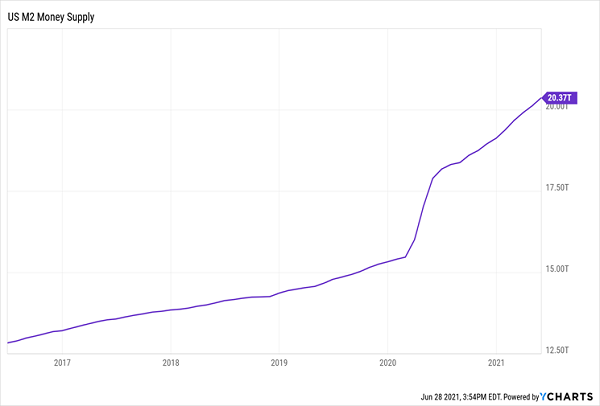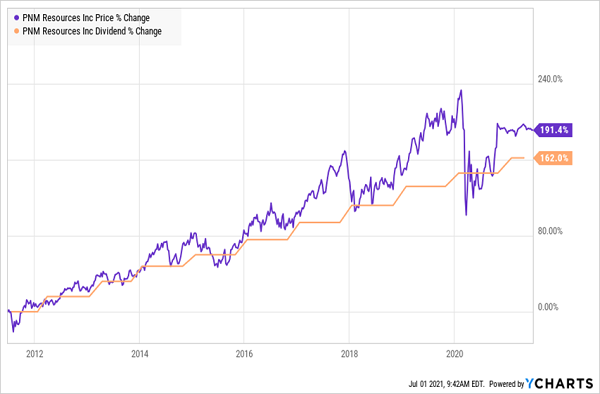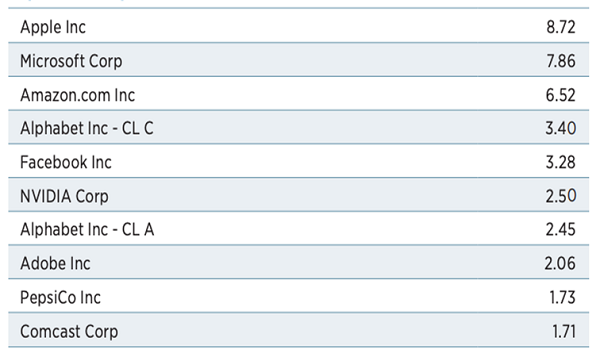The retirement-income battle never ends! Last summer, we watched cautiously for the next dividend cut. This summer, we’re tracking inflation.
No matter the worry, we can apply my “2-step retirement income plan.” It’s designed to keep inflation, another virus wave or pretty well any other calamity from impacting our dividend streams.
Inflation Sideswipes Retirees
First, though, we can “thank” Jay Powell and his runaway money printer for our sleepless nights. You can’t tell me that goosing the money supply by 30% in a little more than a year doesn’t have something to do with rising prices:
Powell Drains Retirees’ Buying Power

And retirees—the folks with the least amount of wiggle room in their monthly income—are taking the brunt. If you’re retired, or near retirement, you’ve probably noticed that some of the things you need the most have seen their prices spike.
Hoping to visit the grandkids this summer? The price of airline tickets jumped 7% in May from a year ago. Forget driving—gas prices are up 56%! And heaven help you if you want to buy a used car: stickers on second-hand rides have spiked 30%.
Other everyday things haven’t been exempt, either: electricity is up 4%. Even the cost of new clothes has risen 6%.
You’re no doubt nodding your head along with this list. And if you’re like me, you think these numbers are too conservative compared to what we see in our local stores.
This is where my two favorite dividend strategies for dealing with our soaring cost of living come in. One is more suitable for an investor who’s years out from retirement, while the other is a perfect way to bulk up your income if you’ve clocked out of the workforce, or are about to do so.
Years From Retirement: Switch on the 'Dividend Magnet'
If you’re still a few years from hanging it up, dividend-growth stocks should be your go-to as inflation heads north, but not just any old dividend growers—we want stocks with payouts that are accelerating.
Companies with soaring payouts pay us in three ways:
- By paying a nice current yield now, and …
- Growing their payouts, which builds our yield on cost (bear that phrase in mind for a second), and
- Share-price growth, as dividend growers’ share prices, puppy dog–like, track their dividends higher.
PNM Resources (NYSE:PNM), which supplies power to 530,000 customers in New Mexico and 256,000 in Texas, ticks all these boxes. (PNM has been on my watch list for a while; it’s the kind of off-the-radar dividend grower we uncover regularly in my Hidden Yields service.)
PNM starts out by paying us a 2.7% dividend. That’s nearly double the S&P 500 average of 1.3%. But dividend growth is where the real magic happens: PNM’s payout has nearly tripled in the last decade, jumping 162%.
In other words, you’re already crushing inflation—even at the current hot rate of 5%, as of May’s CPI report—with a dividend growing 10% a year, on average.
And folks who bought back then don’t care about today’s 2.7% yield. Thanks to the dividend’s runaway growth spree, their yield on cost—or the payout they’re getting on their original buy—has climbed to an astounding 7.8%.
This is, hands down, the safest way to grow an income stream. And it gets better, because a rising dividend is a magnet for share prices. Look at this chart of PNM’s share price climbing with its payout over the last decade. The pattern is unmistakable:
PNM Powers Up Its Dividend Magnet

The result is a total return (or price gains plus dividends) of 283%! Imagine entering retirement with a return like that, including a 7.8% dividend growing 10%+ annually. In that scenario, you’d have little to fear from inflation.
In (or Near) Retirement: Grab These Monthly 7%+ Cash Streams
Now if you’re in or near retirement and need extra income to outrun inflation, buying a stock like PNM and waiting for it to build your yield over a decade or more may not be an option.
This is where one of the best—and by far the most unloved—dividend plays of them all comes in: closed-end funds (CEFs).
There are around 500 CEFs out there, and they offer retirees (and everyone else) the one thing they need most: big dividends, often paid monthly: the typical CEF yields around 6.2% right now, and many pay much more. And you likely won’t even have to sell the S&P 500 stocks you already own to get those payouts!
To see what I mean, consider the Eaton Vance Tax-Managed Buy-Write Strategy Fund(NYSE:EXD),payer of a 7.4% dividend that comes your way monthly. That big payout also held firm straight through the COVID-19 economic collapse—something many S&P 500 names with far smaller payouts, Walt Disney (NYSE:DIS) and Ford (NYSE:F) among them, can’t say.
EXD’s resilient payout is due in part to its strategy of selling covered-call options—which are right investors can purchase to buy EXD’s shares if they trade below a certain level (called the strike price) at a fixed time in the future. This strategy works well in a falling—or at least volatile—market, because if a stock closes below the strike price, EXD keeps its shares and the premium option buyers pay. It then hands us that premium to us as part of our dividend.
So if you think the market is overbought and ripe for a pullback—a reasonable view in light of the S&P 500’s nosebleed P/E ratio of 37—this one is well worth a look.
The rest of EXD’s gains come from its portfolio of stocks, which, as I mentioned, are about as well-known as they come. Look at the list of its top-10 list of holdings; I’d bet you own at least a couple of them:
An American All-Star Portfolio

Source: Eaton Vance
Plus, we can pick up EXD at a price that’s right around its net asset value (NAV, or the value of the shares in its portfolio). That’ll likely flip to a significant premium when volatility picks up again—and investors realize how appealing EXD’s option strategy and its steady, and monthly, 7.4% payout really are.
Disclosure: Brett Owens and Michael Foster are contrarian income investors who look for undervalued stocks/funds across the U.S. markets. Click here to learn how to profit from their strategies in the latest report, "7 Great Dividend Growth Stocks for a Secure Retirement."
